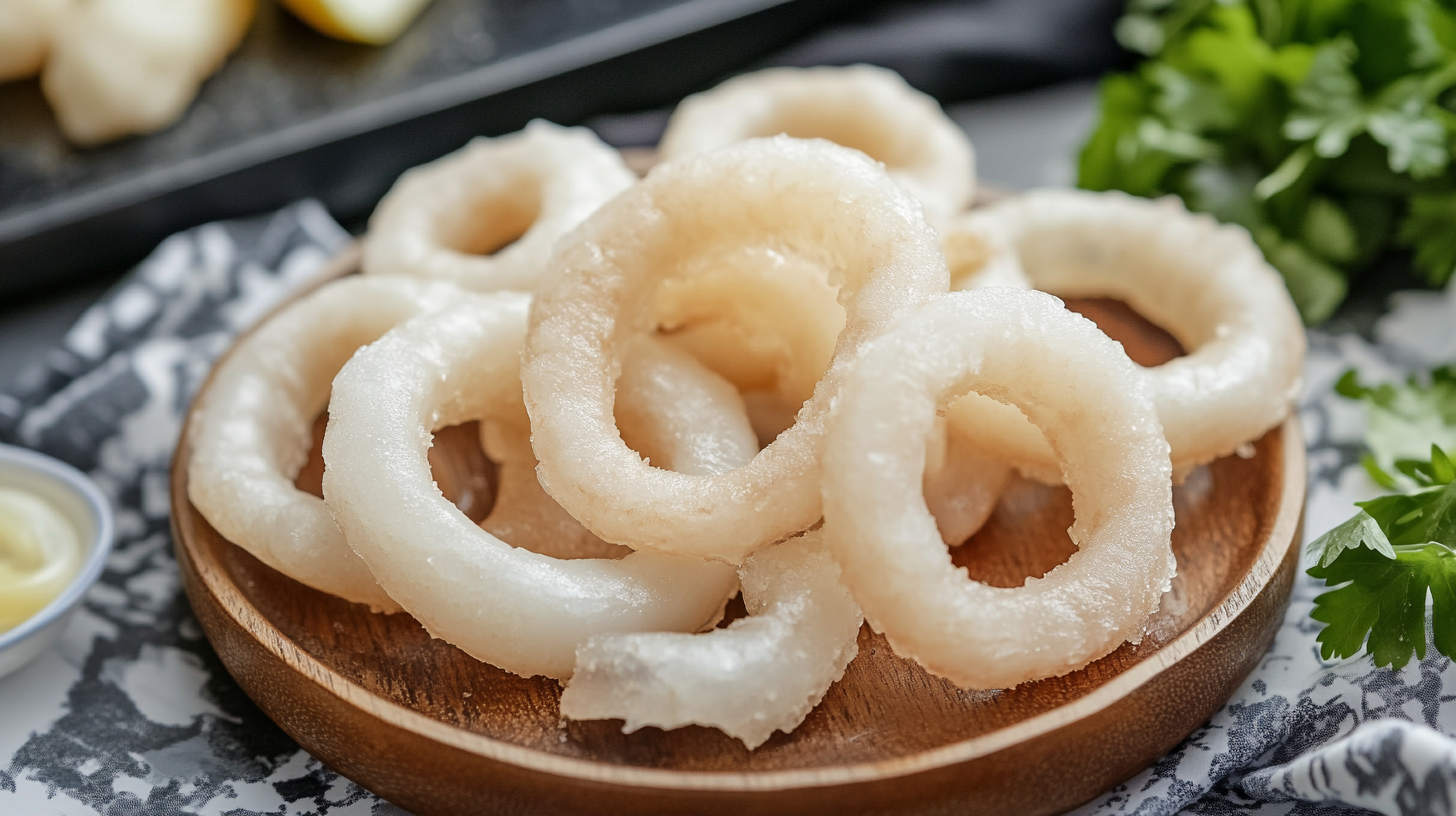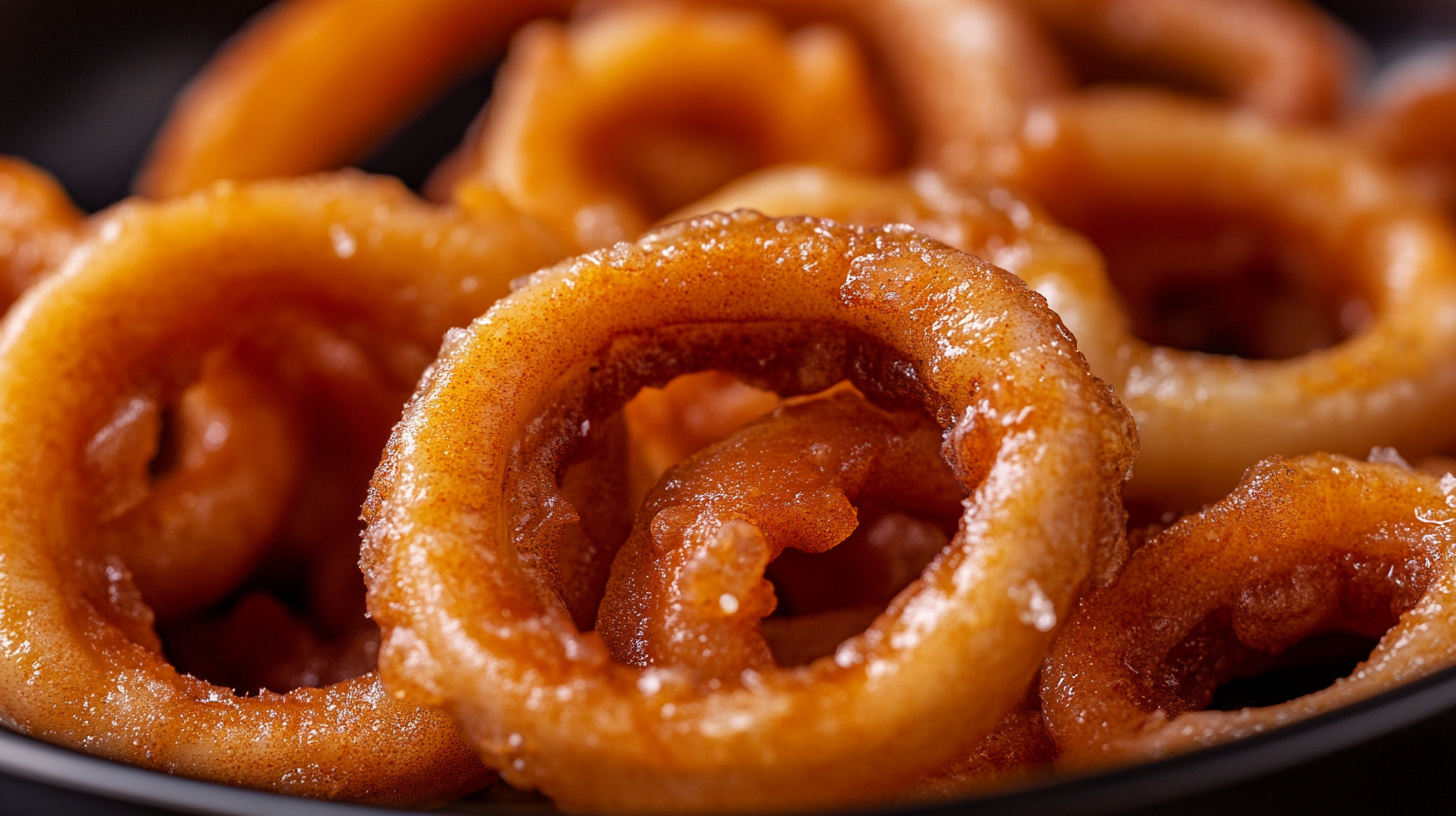 The 137th Canton Fair, held in Guangzhou, marked a significant milestone in the global seafood market, particularly for products like Cooking Frozen Squid Rings. According to recent industry reports, frozen seafood has seen a consistent rise in demand, driven by health-conscious consumers and the restaurant sector's recovery post-pandemic. This year's fair attracted a record 288,938 foreign buyers from 219 countries and regions, reflecting a 17.3% increase compared to the previous session. The total intended export transaction volume reached an impressive $25.44 billion, up 3%, highlighting the growing interest in seafood products, including Cooking Frozen Squid Rings. As businesses prepare for the 138th Canton Fair in October, the focus on quality manufacturers in this sector becomes increasingly vital to meet rising demand and maintain a competitive edge in the global marketplace.
The 137th Canton Fair, held in Guangzhou, marked a significant milestone in the global seafood market, particularly for products like Cooking Frozen Squid Rings. According to recent industry reports, frozen seafood has seen a consistent rise in demand, driven by health-conscious consumers and the restaurant sector's recovery post-pandemic. This year's fair attracted a record 288,938 foreign buyers from 219 countries and regions, reflecting a 17.3% increase compared to the previous session. The total intended export transaction volume reached an impressive $25.44 billion, up 3%, highlighting the growing interest in seafood products, including Cooking Frozen Squid Rings. As businesses prepare for the 138th Canton Fair in October, the focus on quality manufacturers in this sector becomes increasingly vital to meet rising demand and maintain a competitive edge in the global marketplace.
The 137th Canton Fair showcased significant trends in the frozen seafood market, particularly highlighting the rising popularity of frozen squid rings among consumers. According to a recent report by Mordor Intelligence, the global frozen seafood market was valued at approximately $37 billion in 2022 and is projected to grow at a CAGR of 5.4% from 2023 to 2028. This growth is driven by increasing health awareness, as consumers seek protein-rich options that are convenient and easy to prepare. Frozen squid rings, in particular, align perfectly with this trend, offering a versatile ingredient that can be utilized in various culinary applications, from appetizers to main dishes.
Moreover, sustainability remains a critical focus within the seafood industry. The 137th Canton Fair witnessed numerous manufacturers emphasizing eco-friendly sourcing and packaging practices. A report from the Food and Agriculture Organization (FAO) indicates that sustainable seafood practices not only preserve marine ecosystems but also enhance consumer trust. As businesses adapt to these trends, they are leveraging technology and innovative preservation methods to ensure product quality while meeting the demand for environmentally responsible choices. This shift is setting a new standard for frozen seafood products, including squid rings, as consumers increasingly prioritize transparency and sustainability in their purchasing decisions.
The 137th Canton Fair has set a remarkable precedent with record attendance from overseas buyers, marking a new milestone in the realm of international trade. This surge in global participation underscores the resilience and adaptability of Chinese manufacturers, particularly in sectors like frozen seafood, where companies showcase their innovative products. The significant turnout not only reflects the resurgence of trade activities amidst global economic fluctuations but also highlights the growing interest in high-quality Chinese goods from international markets.
Recent reports indicate that the previous Canton Fair saw an impressive increase in overseas buyer attendance, setting a benchmark for future events. This growing momentum is a testament to the effectiveness of the Canton Fair as a platform for fostering international business relationships and expanding market reach. The engagement of global buyers is crucial for Chinese manufacturers, especially those producing niche items such as cooking frozen squid rings, as it opens doors to diverse markets and enhances export opportunities.
Such developments are vital for sustaining growth in China's foreign trade sector, which is increasingly characterized by high-quality products and technological advancements.
The 137th Canton Fair presented a remarkable opportunity to evaluate the leading Chinese manufacturers of cooking frozen squid rings. With the growing global demand for seafood products, the focus on quality and production capabilities became evident. Many manufacturers showcased their advanced processing technologies and strict quality control measures, essential for maintaining freshness and flavor in frozen products. Notably, these companies emphasized sustainable sourcing and environmentally friendly practices, which are increasingly appealing to conscious consumers.
When evaluating these manufacturers, it's crucial to consider a few key tips. First, investigate their sourcing practices to ensure they adhere to sustainability standards. This not only benefits the environment but also reflects positively on the product quality. Second, inquire about their certifications and quality control processes. Accredited manufacturers typically implement rigorous checks at every stage of production, from raw material selection to the final packaging. Lastly, engage with past clients or explore reviews to gauge their reputation in the industry; satisfied customers often provide insights that can aid in making informed decisions.
The diversity of products and innovations presented at the Canton Fair reinforces the significance of the Chinese frozen seafood market, particularly for cooking frozen squid rings. By carefully evaluating these manufacturers, buyers can find reliable partners to meet their culinary needs.
| Rank | Manufacturer | Location | Annual Production (Tons) | Export Markets | Certifications |
|---|---|---|---|---|---|
| 1 | Manufacturer A | Fujian | 5000 | USA, Japan, Europe | HACCP, ISO 9001 |
| 2 | Manufacturer B | Guangdong | 4500 | Asia, Australia | BRC, ISO 22000 |
| 3 | Manufacturer C | Shandong | 6000 | Middle East, Europe | HACCP, ISO 9001 |
| 4 | Manufacturer D | Zhejiang | 5500 | North America, Australia | ISO 22000, BRC |
| 5 | Manufacturer E | Liaoning | 7000 | Europe, Asia | HACCP, ISO 9001 |
| 6 | Manufacturer F | Sichuan | 3000 | North America | ISO 22000, BRC |
| 7 | Manufacturer G | Haiyang | 4000 | Japan, Europe | HACCP, ISO 9001 |
| 8 | Manufacturer H | Tianjin | 3500 | Asia, North America | BRC, ISO 22000 |
| 9 | Manufacturer I | Hebei | 3800 | Europe | HACCP, ISO 9001 |
| 10 | Manufacturer J | Shanghai | 3200 | Japan, Australia | ISO 22000, BRC |
The frozen squid rings market is projected to experience substantial growth in 2025, driven by increasing demand in both domestic and international markets. According to a recent report by Mordor Intelligence, the global seafood market is expected to expand at a CAGR of 4.4% from 2020 to 2025, with frozen products, including squid rings, leading this trend. The rise in health-conscious consumers seeking protein-rich diets and the convenience of frozen seafood options are significant contributors to this growth.
As manufacturers gear up for the 137th Canton Fair, understanding the export potential of frozen squid rings is essential. The growing popularity of Asian cuisine and the increasing export activities from China's seafood sector present a unique opportunity for manufacturers. Reports indicate that the export volume of frozen squid products from China has increased by 15% over the past year, enhancing its position as a leading supplier in the global market.
Tip: When considering sourcing frozen squid rings, look for manufacturers with strong quality certifications and sustainable sourcing practices to ensure product reliability and appeal in the international market.
Tip: Attend trade shows like the Canton Fair to establish direct contact with manufacturers and gain insights into emerging trends in the frozen seafood industry, allowing for tailored marketing strategies that align with consumer preferences.

As the seafood industry continues to evolve, projections for growth and innovation are vital. According to a recent report by Market Research Future, the global seafood market is expected to reach approximately $200 billion by 2025, growing at a CAGR of 4.5% from 2019. Factors driving this growth include rising consumer demand for frozen seafood products, driven by their convenience and longer shelf life. The 138th Canton Fair will showcase how manufacturers, especially those specializing in cooking frozen squid rings, are adapting to these changing consumer preferences.

Furthermore, sustainability has become a significant focus among seafood manufacturers. A report from the Food and Agriculture Organization (FAO) indicates that over 80% of the fish caught globally is sourced from sustainable fisheries, with brands increasingly prioritizing eco-friendly practices. This shift aligns with consumer expectations for environmentally responsible sourcing, making it a crucial topic at upcoming trade fairs.
As the seafood industry gears up for the 138th Canton Fair, manufacturers are expected to present innovative products that cater to both sustainability and the increasing demand for high-quality frozen seafood options, reflecting the broader trends shaping the market.
